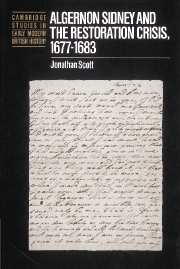Conclusion
Published online by Cambridge University Press: 13 March 2010
Summary
The Athens I love is not the one that is wronging me now, but that one in which I used to have secure enjoyment of my rights as a citizen. The country that I am attacking does not seem to me to be mine any longer; it is rather that I am trying to recover a country that has ceased to be mine. And the man who really loves his country is not the one who refuses to attack it when he has been unjustly driven from it, but the man whose desire for it is so strong that he will shrink from nothing in his efforts to get back there again.
Alcibiades, to the Spartans, 415 BCThe remarkable career of Algernon Sidney the martyr has been recounted elsewhere. Constructed, Frankenstein-like, from the remnants of a living person, Algernon the ‘stern inflexible patriot’ had a number of qualities true to his original. On the whole however that original was Sidney in death, rather than life. Reinforcing Sidney's stoicisation of himself was a perceptible rigormortis by which this inflexibility was maintained over continents, and centuries. Allied to it was an incorruptibility apparently superior to death itself. In the last decade of the eighteenth century, when public excitement could contain itself no longer, Algernon's grave was opened. ‘Curiosity was excited – the body was very perfect.’ Sidney the patriot-hero was a triumph of the mortician's art.
- Type
- Chapter
- Information
- Algernon Sidney and the Restoration Crisis, 1677–1683 , pp. 348 - 359Publisher: Cambridge University PressPrint publication year: 1991



